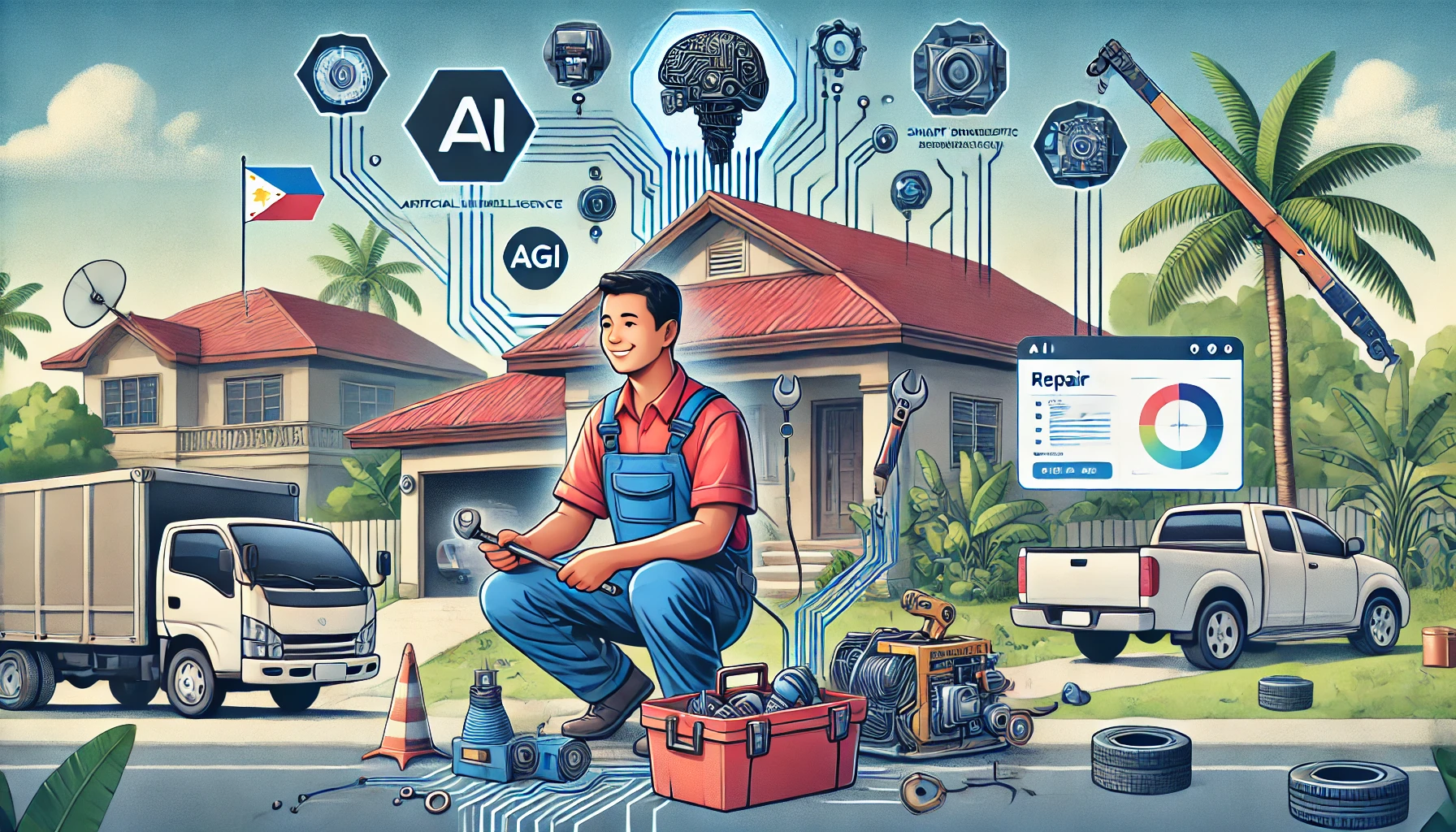Artificial General Intelligence (AGI), the next frontier in AI development, has the potential to transform industries worldwide. For handyman and repair service firms in the Philippines, leveraging AGI can lead to increased efficiency, improved customer service, and greater profitability. Here’s how these businesses can harness the power of AGI to their advantage.
1. Enhanced Scheduling and Route Optimization
AGI can revolutionize scheduling and logistics for handyman services. With its ability to analyze vast amounts of data, AGI systems can:
- Predict traffic patterns to optimize travel routes, reducing fuel costs and saving time.
- Automate appointment scheduling by balancing technician availability and client urgency.
- Notify customers in real-time about service arrival times, enhancing customer satisfaction.
2. Smart Diagnostics and Troubleshooting
Repair tasks often begin with identifying the problem. AGI-powered tools can significantly improve this process by:
- Using advanced diagnostic algorithms to identify issues faster and more accurately.
- Providing technicians with real-time troubleshooting advice through augmented reality (AR) devices.
- Enabling remote diagnostics, allowing customers to describe their problems via apps that AGI can analyze before dispatching a technician.
3. Predictive Maintenance Services
AGI excels at analyzing historical and real-time data to predict when equipment or systems might fail. Handyman firms can offer predictive maintenance services, helping clients avoid costly breakdowns by:
- Monitoring appliances, plumbing systems, or electrical circuits via IoT-connected devices.
- Sending timely alerts for preventive repairs, reducing emergency call-outs and fostering customer loyalty.
4. Automating Administrative Tasks
Back-end processes like invoicing, inventory management, and payroll can be time-consuming. AGI can streamline these tasks by:
- Automating invoice generation and payment tracking.
- Managing inventory by predicting the need for specific tools or parts based on job trends.
- Handling employee schedules, payroll, and performance reviews with minimal human intervention.
5. Marketing Personalization
With AGI’s ability to process and analyze customer data, handyman firms can enhance their marketing efforts by:
- Creating personalized marketing campaigns tailored to individual customer preferences and needs.
- Predicting customer behavior and targeting the right audience at the right time with promotions.
- Offering dynamic pricing models based on demand, availability, and competition.
6. Skill Augmentation for Technicians
AGI-powered tools can augment the skills of technicians by:
- Providing real-time assistance through wearable devices or mobile apps.
- Offering on-the-job training modules powered by AGI, enabling technicians to upskill continuously.
- Standardizing quality across all services by ensuring that all technicians follow best practices suggested by AGI.
7. Expanding Service Offerings
AGI can help handyman firms diversify their services by:
- Analyzing market trends to identify in-demand services.
- Training technicians quickly for new tasks using AGI-driven simulations.
- Developing partnerships with other businesses by offering bundled services tailored to specific customer segments.
8. Cost Reduction and Efficiency Gains
By automating routine and repetitive tasks, AGI can help businesses reduce labor costs and improve efficiency. For example:
- Virtual customer support agents powered by AGI can handle inquiries, reducing the need for full-time office staff.
- Predictive analytics can minimize waste by ensuring optimal use of materials and resources.
Challenges to Overcome
While the potential benefits are significant, adopting AGI comes with challenges:
- Cost of Implementation: Initial investments in AGI technology can be high. Government incentives or partnerships with tech providers might ease this burden.
- Skill Gap: Employees may require training to work effectively with AGI-powered systems.
- Ethical Considerations: Businesses must ensure AGI systems respect customer privacy and comply with data protection regulations.
Conclusion
The handyman and repair services industry in the Philippines is ripe for disruption through AGI. By embracing this transformative technology, firms can not only improve operational efficiency but also deliver unparalleled customer experiences. The key is to start small—perhaps by automating scheduling or integrating predictive maintenance—and scale as the benefits become evident.
As AGI becomes more accessible, early adopters in the Philippines’ handyman and repair industry are likely to outpace competitors, driving innovation and profitability in the sector.
[SEO optimized]


